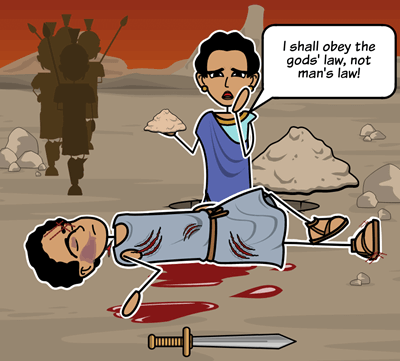Student Activities for Antigone
Essential Questions for Antigone
- Should we rebel against laws that go against our conscience?
- How do our values and responsibilities shape our interactions in life?
- What does our response to conflict teach us about ourselves?
- Are we defined by our actions?
Antigone Summary
The Antigone play takes place in the war-torn city of Thebes. After Oedipus has left the city, his sons, Eteocles and Polynices, fought for the throne. Polynices besieged the city with foreign troops. Both died during the fighting, and this leaves Oedipus' brother-in-law, Creon, to rule. While he buried Eteocles with full funeral rights, Creon declared Polynices a traitor, and forbade anyone in Thebes from burying him. This was a powerful statement; the Greeks believed that this meant the unburied soul could not enter the afterlife.
Antigone, the sister of Polynices and Eteocles, decides to defy her uncle and ensure her brother enters the afterlife. All she must do is sprinkle a little dirt on him, and he will be set free. She succeeds, but is discovered, and is brought in front of her uncle. She doesn't deny the allegations when questioned. He sentences Antigone to death. Later he speaks with his son, Haemon, who is Antigone's finance. It becomes clear that even his son disagrees with Creon's choices. The two argue, and when Creon threatens to have Antigone executed in front of them, Haemon storms out. Creon orders that Antigone should be walled up in a cave, and left to die.
The famous seer, Tiresias, arrives and advises Creon to bury Polynices. Even though Creon stated he would do as Tiresias says, he does not, and Tiresias predicts that Creon's actions will bring a plague upon the city. Creon heeds Tiresias's words, fearing the wrath of the gods, and he decides to spare Antigone's life. It is too late. While Creon is giving Polynices a proper burial, Haemon finds Antigone has hanged herself. When Creon arrives at the cave, Haemon tries to kill his father, and when he fails, kills himself. The queen hears her only living son is dead, and she stabs herself, but first she puts a curse on her husband. Creon is left at the end of the play, alive, but filled with sorrow.
Additional Activities for Antigone
- Have your students locate important Antigone quotes and create storyboards to illustrate them.
- Have students create a storyboard with the stage background and illustrate a set they might design for Antigone performances.
- Have students research ancient Greece and illustrate the daily life of a person in that time period.
How Tos about Antigone by Sophocles
Introduce Antigone’s moral dilemma with a classroom debate
Engage students by setting up a debate about Antigone’s choice to defy Creon. Divide the class into two groups—one supporting Antigone’s actions and one supporting Creon’s law. Let students use evidence from the text to build their arguments. This strategy encourages critical thinking and helps students connect themes to real-life decisions.
Connect essential questions to students’ own experiences
Ask students to choose one essential question from the unit and write a short reflection about a time they faced a similar challenge. Share and discuss answers in small groups. This makes abstract themes relatable and deepens understanding.
Create character maps to explore motivations
Have students draw or use online tools to map out Antigone, Creon, and Haemon’s motivations and conflicts. Connect traits to actions shown in the play. This visual method clarifies relationships and helps students analyze character development.
Design a modern-day scenario inspired by Antigone
Challenge students to write a short script or storyboard where a character faces a similar moral dilemma in today’s world. Encourage creativity and discussion about how ancient themes still matter now. This helps students synthesize ideas and apply literary analysis.
Assess understanding with a quick exit ticket
At the end of the lesson, ask students to write one thing they learned about moral choices from Antigone. Collect responses as they leave to gauge understanding and guide future lessons.
Frequently Asked Questions about Antigone by Sophocles
What is the main theme of Antigone by Sophocles?
The main theme of Antigone is the conflict between individual conscience and state law. Antigone defies King Creon's decree to honor her brother, highlighting themes of loyalty, fate, and moral responsibility.
How can I quickly introduce Antigone to my students?
Start by sharing a brief summary of Antigone: a tragedy set in Thebes where Antigone defies her uncle Creon to bury her brother. Use essential questions to spark discussion and storyboard activities for engagement.
What are some easy Antigone lesson plan ideas for middle or high school?
Try using storyboards to illustrate key scenes, researching ancient Greek life, or having students locate and visualize important quotes. Incorporate debates on the play’s ethical dilemmas for active learning.
Why did Antigone defy Creon's orders?
Antigone defied Creon’s orders because she believed honoring her brother’s burial was a sacred duty, outweighing the laws of the state. Her actions reflect ancient Greek values of family loyalty and religious obligation.
What are some essential questions I can ask students about Antigone?
Use essential questions such as: Should we rebel against unjust laws? How do values shape our actions? What does conflict reveal about character? These promote critical thinking and class discussion.
© 2026 - Clever Prototypes, LLC - All rights reserved.
StoryboardThat is a trademark of Clever Prototypes, LLC, and Registered in U.S. Patent and Trademark Office





